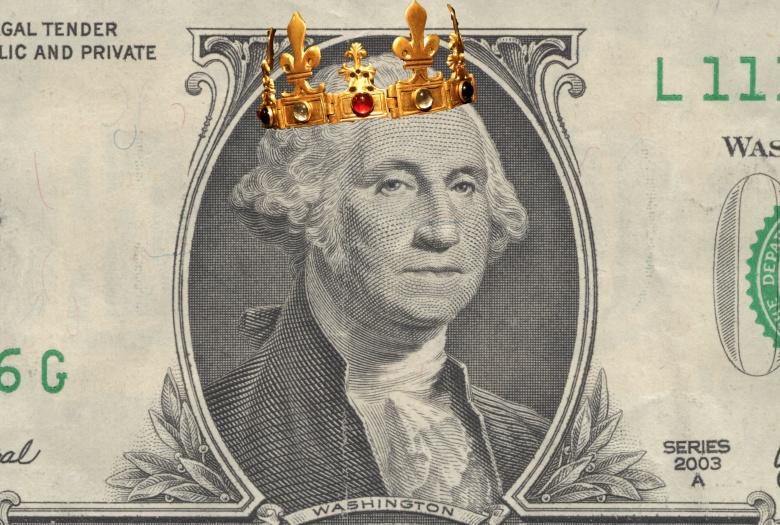King Dollar? Rabobank Warns “Staying On Thrones Means A Battle At Some Point”
Tyler Durden
Tue, 08/04/2020 – 11:00
Authored by Michael Every via Rabobank,
“The King is dead. Long live the King!”
TikTok now has 44 days (and counting) to arrange a sale to Microsoft or be banned, which is legally known as “forced divestment”, I believe, and will naturally never be considered by China as a form of retaliation against US firms based there. At least that’s what the US firms still based there are no doubt telling themselves as they continue to say “This is fine” over and over despite all manner of worrying developments in the Chinese economy and US-China relations. Muddying the waters, the White House now wants a slice of the action for rewarding Microsoft with such a juicy deal – because when one thinks of cool kids sharing 15-second ADHD-driven mini-videos that make adults groan, one does not traditionally think of traditional firms like Microsoft. Moreover, China hawk Navarro is attacking Microsoft for being in China at all, albeit critics point out often in the form of pirated software. He’s suggesting Microsoft should divest their China business. Which is at least symmetrical. It’s also deep decoupling.
In short, you thought China was the new tech king? Perhaps it is, yet the old US king –who comes across to some like the one in the 1977 film ‘Jabberwocky’ (“King Bruno the Questionable”)– has just shown it can still take off more than a few heads too with just a wave of a hand.
Meanwhile, with US 10-year yields up only a few basis points from their year-to-date closing low, it’s worth wondering if one of the ‘kings’ of recent trades, long bond duration, is really over or not. The US tech titans who testified to Congress last week tried to portray the US as vibrant. Well, it is for them. Facebook CEO Zuckerberg in particular stressed that there is a rapid turnover among the largest US firms, like his, which proves that innovation and dynamism and competition are still there. Well, imagine a medieval peasant. He doesn’t have the best of times of it under his king. However, once every ten years or so, a new knight rides in, kills the king and takes the throne. As the peasant shovels old muck for the new king, I am sure the first thing he says to himself is “What a vibrant, dynamic, meritocratic economy we have!” It’s a structural economic problem – and we are being offered neither a structural solution nor an adequate cyclical response. There is still no white smoke on stimulus from Congress, for example.
Less muck, more brass. Do we have a dynamic recovery from the virus we can point to? No. Yes, PMIs are over 50. No, that does not mean anything at the moment, as this measures month-to-month changes in sentiment, which is obviously up, but which is still massively down year-on-year on almost any measure. Yes, you can give people 50% of the price of a burger to eat one, and they will go and do so, as the UK government now shows is the case; but, no, ask them to pay full-price to risk illness to do so and the restaurants and cafes will likely be too empty again. That’s a pretty deflationary backdrop if you ask me. At least one king is not dead.
And neither is another – the USD. King Dollar, who has seen so much talk of dethroning of late, has had a good few days, even if it is leaning on its sword breathing heavily right now. EUR/USD is currently at 1.1770 when it was over 1.19 last week; and against a wobbly EM benchmark like ZAR it is at 17.19 when it was at 16.70 last Friday. The USD is almost certainly oversold and, as our own Piotr Matys points out, at a critical technical support level. We shall see if he can keep his throne or not.
However, this is not just about lines on charts. It’s about lines on maps. Staying on thrones usually involves battle of some kind at some point.
Kings should get that: it used to be called statecraft and grand strategy: one to stay in power over internal rivals, and one to and ensure one’s power was not challenged externally either. Economics was always a subset of that world view, not the world view itself. Those not solely focused on Bloomberg or on selling cars or cheese should look at the geostrategic game playing out between the US and China from Hong Kong to the South China Sea to the East China Sea to the Indian border to Iran to Syria to Lebanon to Djibouti, and realise that this is deadly serious. Perhaps deadly weapons can be avoided, although this is the old king’s comparative advantage over the new one. However, to avoid doing so is surely still going to require usage of the “US Dollar weapon” via sanctions and access to the US market…as we already see in the case of TikTok.
In short, there is more of this to come. Much more. So tick-tock more like. Which suggests long USD and long duration is still a king of trades.
Australia’s in-no-way regal RBA have underlined this with news that their bond buying will begin again tomorrow to ensure that the Aussie 3-year yield stays where they want it at 0.25%. A pity they can’t keep the virus where they (don’t) want it; or jobs where they want them, or house prices, or retail sales (-3.4% q/q in Q2 excluding inflation); or US-China relations; although they will be happy that exports were still up 3% y/y in June, while imports were up 1%.
Oh, and Spain’s former king Juan Carlos has just had to flee the country to avoid becoming embroiled in a corruption scandal.
